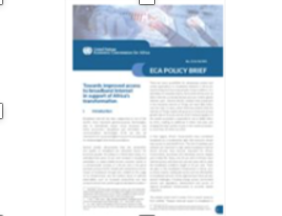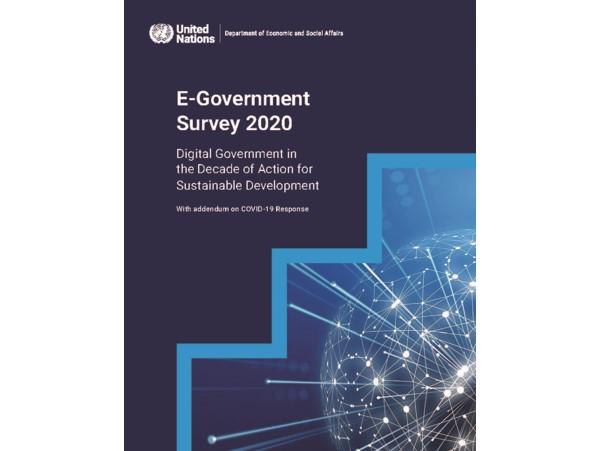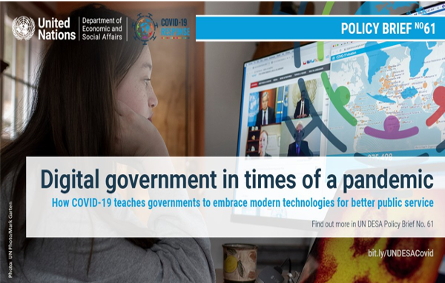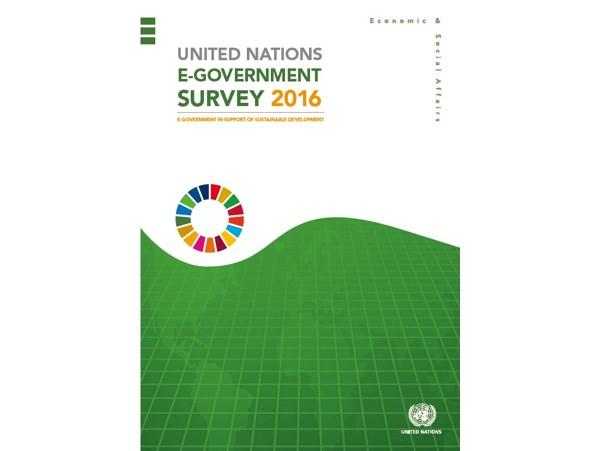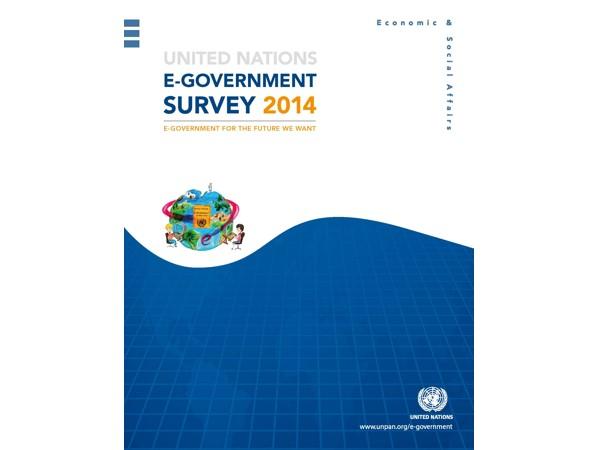Resources
Displaying 13 - 24 of 43
Capacity Development Webinar on Leveraging Digital Government & Spearheading Innovative Digital Solutions to Address the COVID-19
| English | Digital Government | Global | Webinar | UN DESA/DPIDG
Governments across the Caribbean have been severely impacted by the COVID-19 pandemic, due to their high economic dependence on travel and tourism, which have virtually collapsed as a result of border closures and restrictions. In the context of already high public debt levels and an even more limited fiscal space following the pandemic, Caribbean governments are endeavoring to strengthen public health interventions while limiting the impact of…
Towards Improved Access to Broadband Internet in Support of Africa’s Transformation
| English | Digital Government | Africa | Policy Brief | ECA
North African economies are characterized by slow economic diversification and persistent unemployment, especially among educated youth. Labour productivity has registered only a moderate increase compared with more dynamic emerging countries like India or Turkey. These patterns share a common origin, which lies in the existence of many distortions in the economy that prevent an efficient allocation of resources between firms and sectors. These…
Regional Conversation Series on Building Back Better: Accelerating Digital Connectivity and Leveraging Innovation
| English | Digital Government | Asia and the Pacific | Webinar | ESCAP
Asia and the Pacific is a key driver of a technological revolution that is profoundly transforming the way we live, work and relate to one another. At the same time, the region is also one of the most digitally divided, with less than 14 per cent of the population connected to affordable and reliable high-speed Internet. Around 52 per cent of the region’s population remains offline. As the COVID-19 new normal has seen our reliance on…
Assessing Regional Integration in Africa - ARIA IX
| English | Digital Government | Africa | Publication | ECA
Signed by 52 African countries, the African Continental Free Trade Area (AfCFTA) is, by the number of participating countries, the largest trade agreement since the formation of the WTO. By 1 April 2019, only one year and ten days after the signature, the threshold of ratification by 22 countries required for the agreement’s entry into force had been reached. The speed of this ratification is unprecedented in African Union history.
With so…
Legal Aspects of Open Government and Open Data
| English | Digital Government | Middle East | Publication | ESCWA
Laws and regulations related to access to information and openness are very important for the implementation of open government principles. These laws cover several areas, such as access to information, protection of personal data, citizen participation and anti-corruption. However, the access information law is the basis and core stone for open government. The adoption of this law, and its implementation are of great importance for launching…
Accelerating Digital Inclusion in the New Normal
| English | Digital Government | Global | Publication | WEF
COVID-19 has highlighted how critical digital connectivity is to governments, businesses, and society, and has brought a newfound sense of urgency to the digital inclusion agenda. While the crisis has enabled hundreds of millions to participate online, it has also exacerbated the digital divide for 47% of the world’s population that remains unconnected. The post-COVID world will be more digital – requiring more connectivity, digital skills, and…
United Nations E-Government Survey 2020
| Arabic | Chinese | English | Russian | Spanish | Digital Government | Global | Publication | UN DESA/DPIDG
The year 2020 witnessed a transformational change in global development as the United Nations Secretary-General António Guterres called on Member States and other stakeholders to “kickstart a decade of delivery and action for people and planet”, given the short time left to achieve the 2030 Agenda for Sustainable Development.By surveying and studying broad patterns of digital government around the world, the United Nations E-Government Survey…
COVID-19: Embracing Digital Government During the Pandemic and Beyond
| English | Digital Government | Global | Policy Brief | UN DESA/DPIDG
The COVID-19 pandemic is forcing governments and societies to turn toward digital technologies to respond to the crisis in the short-term, resolve socio-economic repercussions in the mid-term and reinvent existing policies and tools in the long-term. Navigating through these challenging times requires governments to adopt an open government approach and to use digital communication channels to provide reliable information on global and national…
Hello, World: Artificial Intelligence and Its Use in the Public Sector
| English | Digital Government | Global | Publication | CIIIAP
The primer is the result of 10 months of research and analysis focused specifically on the use and implications of AI in government. It has benefited from the input of dozens of experts and stakeholders, including through a seven-week public consultation, which received about 1,500 comments from over 75 individuals or organisations, including governments, academics, AI experts, businesses, and civil society organisations. OPSI made many…
United Nations E-Government Survey 2018
| Arabic | Chinese | English | Russian | Spanish | Digital Government | Global | Publication | UN DESA/DPIDG
The 2018 UN E-Government Survey is published as the implementation of the 2030 Agenda for Sustainable Development Goals (SDGs) advances to its third year. Governments have the critical responsibility to pursue policies and measures to build resilience and assist those most affected by shocks in achieving SDGs. They must find ways to anticipate disasters and shocks and lower their impact. Digital technologies are increasingly being used by…
United Nations E-Government Survey 2016
| English | Digital Government | Global | Publication | UN DESA/DPIDG
The UN E-Government Survey 2016 on “E-Government in Support of Sustainable Development” offers a snapshot of trends in the development of e-government in countries across the globe. According to the Survey more governments are embracing information and communication technologies (ICTs) to deliver services and to engage people in decision-making processes in all regions of the world. The 2016 UN E-Government Survey provides new evidence that e-…
United Nations E-Government Survey 2014
| Arabic | Chinese | English | Russian | Digital Government | Global | Publication | UN DESA/DPIDG
At the United Nations Conference on Sustainable Development held in Rio de Janeiro in June 2012, a global consensus was reached that to achieve our sustainable development goals we need institutions at all levels that are effective, transparent, accountable and democratic. E-government holds tremendous potential to improve the way that governments deliver public services and enhance broad stakeholder involvement in public service.
The 2014…
 Welcome to the United Nations
Welcome to the United Nations

